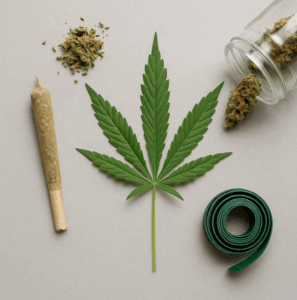Cannabis (Ganja) Addiction Recovery: What You Need to Know
 Cannabis — often called ganja, weed, or marijuana — is commonly seen as a “safe” or “natural” substance. In India, its use is sometimes normalized, especially during festivals or social gatherings. But regular and excessive use can lead to dependence, psychological issues, and disruption of daily life.
Cannabis — often called ganja, weed, or marijuana — is commonly seen as a “safe” or “natural” substance. In India, its use is sometimes normalized, especially during festivals or social gatherings. But regular and excessive use can lead to dependence, psychological issues, and disruption of daily life.
Recovery from cannabis addiction is not only possible — it is life-changing.
When Does Cannabis Use Become a Problem?
Occasional or cultural use does not always lead to addiction. But when use becomes frequent, compulsive, and affects health or relationships, it may indicate a cannabis use disorder.
Warning signs include:
-
Using cannabis daily or multiple times a day
-
Difficulty stopping despite promises to self or others
-
Memory issues, low motivation, or poor concentration
-
Skipping school, college, or work to get high
-
Using it to cope with boredom, anxiety, or emotional pain
-
Increased irritability, paranoia, or sleep disturbances when not using
Many people try to quit but relapse within days or weeks — not because they’re weak, but because cannabis withdrawal is real.
Common Cannabis Withdrawal Symptoms
-
Irritability and mood swings
-
Anxiety or restlessness
-
Poor sleep and vivid dreams
-
Headaches or sweating
-
Intense cravings
These symptoms usually peak within a week of stopping and can last up to 2–3 weeks. With support, they can be managed effectively.
Steps to Recovery from Ganja Addiction
✅ 1. Acknowledge the Problem Without Shame
The first step is not denial or guilt — but honest acceptance. Addiction is not a moral failure; it’s a behavioral pattern that can be changed.
✅ 2. Set a Clear Intention to Quit
Make a personal commitment. Write down your reasons — health, career, family, clarity, peace. Keep them visible.
✅ 3. Seek Professional Help
Psychiatrists and psychologists can help you with:
-
Counseling and motivation therapy (MET, CBT)
-
Detox support and sleep stabilization
-
Managing underlying issues like anxiety, ADHD, or depression
-
Monitoring progress and preventing relapse
✅ 4. Build a Daily Routine
Cannabis often takes over your day. Fill your time with:
-
Exercise or yoga
-
Work or study
-
Reading or learning new skills
-
Journaling or group support
Structure gives strength.
✅ 5. Avoid Triggers
Stay away from people, places, or music/movies that glamorize or prompt use. Even changing your phone wallpaper or playlist can help reset your mindset.
Can Cannabis Cause Mental Illness?
Yes. Long-term use — especially in adolescents or people with genetic risk — can increase the chances of:
-
Psychosis (hallucinations or delusions)
-
Anxiety disorders
-
Amotivation syndrome — a persistent lack of drive
-
Memory and learning issues
The earlier you quit, the better your brain recovers.
Cannabis Addiction in India: Cultural Confusion
In India, the holy vs harmful debate around ganja often confuses young people. While ancient texts mention its use in rituals, today’s street cannabis is often adulterated, potent, and used for escapism — not spirituality.
Recovery doesn’t mean rejecting your culture — it means choosing clarity, peace, and health.
Ready to Quit? Help Is Available
👨⚕️ Dr. Srinivas Rajkumar T
Consultant Psychiatrist
📍 Apollo Clinics, Velachery & Tambaram, Chennai
📞 8595155808
🌐 www.srinivasaiims.com
Whether you’re dealing with daily use, sleep issues, or a sense of emotional numbness from cannabis — I offer discreet, compassionate care to help you recover and rebuild.
Take the first step. Clear your mind. Reclaim your life.